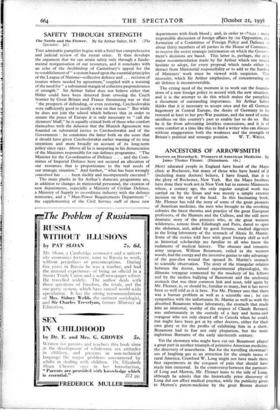SAFETY THROUGH STRENGTH
THIS admirable pamphlet begins with a brief but comprehensive and judicial review of the recent crisis. It then develops the argument that we can attain safety only through a funda- mental reorganisation of our resources, and it concludes with an echo of the Archbishop of Canterbury's appeal for the re-establishment of " a system based upon the essential principles of the League of Nations—collective defence and . . . revision of treaties where needed by agreement," coupled with a warning of the need for " a substantial margin of collective preponderance of strength." Sir Arthur Salter does not believe either that Hitler could have been deterred from crossing the Czech frontier by Great Britain and France threatening war or that '` the prospects of defending, or even restoring, Czechoslovakia were sufficiently good to justify a war on that issue." But while he does not join the school which believes that in order to ensure the peace of Europe it is only necessary to " call the dictators' bluff," he is equally critical both of those who comfort themselves with the delusion that the Munich Agreement was founded on substantial justice to Czechoslovakia and of the Government : he condemns the latter both on the score that it should have given Czechoslovakia earlier warning of its true intentions and more broadly on account of its long-term policy since x931. Above all he is unsparing in his denunciation of the Ministers responsible for our defence programme. "The Minister for the Co-ordination of Defence . . . and the Com- mittee of Imperial Defence have not secured an allocation of our resources that is proportionate to the real needs of our strategic situation." And further, " what has been wrongly conceived has . . . been slackly and incompetently executed."
The main planks in Sir Arthur's domestic programme are, in addition to changes in ministerial personnel, the creation of new departments, especially a Ministry of Civilian Defence, a Ministry of Supply to co-ordinate industry with the defence ministries, and a " Man-Power Requirements Department " : the supplementing of the Civil Service staff of these new
departments with fresh blood ; and, in order to e.t.t.-in a more responsible discussion of foreign affairs by the Opposition, the Ij formation of a Committee of Foreign Policy and" Defence of about thirty members of all parties in the House of Commons, to receive the secret strategic information on which the Govern. ment's decisions are based. This latter is, perhaps, the only major recommendation made by Sir Arthur which one would hesitate to adopt, for every proposal which tends either to detract from Ministerial responsibility or to add to the burden of Ministers' work must be viewed with suspicion. The necessity, which Sir Arthur emphaiises, of concentrating on air defence is incontrovertible.
The crying need of the moment is to work out the founda- tions of a new foreign policy to accord with the new situation, and it is the attempt to do this which makes the pamphlet a document of outstanding importance. Sir Arthur Salter thinks that it is necessary to accept once and for all German hegemony in Central Europe, the desire of Germany to be restored at least to her pre-War position, and the need of some sacrifices on this country's part to enable her to do so. But he is far from advocating limitless concessions, and it is of some comfort at a time like this to find a writer who can discuss without exaggeration both the weakness and the strength of Britain's political and strategic position. W. T. WELLS.















































 Previous page
Previous page